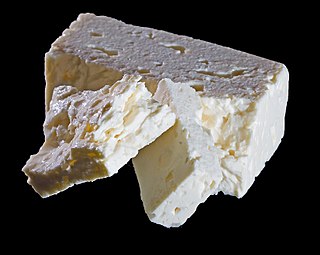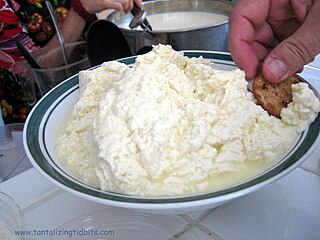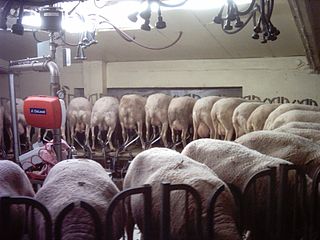
Halloumi or haloumi is a cheese of Cypriot origin made from a mixture of goat's and sheep's milk, and sometimes also cow's milk. Its texture is described as squeaky. It has a high melting point and so can easily be fried or grilled, a property that makes it a popular meat substitute. Rennet is used to curdle the milk in halloumi production, although no acid-producing bacteria are used in its preparation.

String cheese is any of several different types of cheese where the manufacturing process aligns the proteins in the cheese, which makes it stringy.

Feta is a Greek brined white cheese made from sheep's milk or from a mixture of sheep and goat's milk. It is soft, with small or no holes, a compact touch, few cuts, and no skin. Crumbly with a slightly grainy texture, it is formed into large blocks and aged in brine. Its flavor is tangy and salty, ranging from mild to sharp. Feta is used as a table cheese, in salads such as Greek salad, and in pastries, notably the phyllo-based Greek dishes spanakopita "spinach pie" and tyropita "cheese pie". It is often served with olive oil or olives, and sprinkled with aromatic herbs such as oregano. It can also be served cooked, as part of a sandwich, in omelettes, and many other dishes.

Lancashire is an English cow's-milk cheese from the county of Lancashire. There are three distinct varieties of Lancashire cheese. Young Creamy Lancashire and mature Tasty Lancashire are produced by a traditional method, whereas Crumbly Lancashire is a more recent creation suitable for mass production.

Goat cheese, goat's cheese or chèvre is cheese made from goat's milk. Goats were among the first animals to be domesticated for producing food. Goat cheese is made around the world with a variety of recipes, giving many different styles of cheeses, from fresh and soft to aged and hard.

Kashkaval is a type of cheese made from cow's milk, sheep's milk or both. In Albania, Bulgaria, North Macedonia, Romania and Serbia, the term is often used to refer to all yellow cheeses. In English-language menus in Bulgaria, kashkaval is translated as "yellow cheese".

Ricotta is an Italian whey cheese made from sheep, cow, goat, or Italian water buffalo milk whey left over from the production of other cheeses. Like other whey cheeses, it is made by coagulating the proteins that remain after the casein has been used to make cheese, notably albumin and globulin.

Parlick is an approximately cone-shaped steep-sided hill at the extreme south of the main range of Bowland fells in Lancashire, England. Its bog-free sides make it more popular with walkers than the shallow boggy hills to its north. Paths zigzag up this hill from the south, or for the more strenuous ascent a straight path can be chosen. This hill is usually green — different from the often thorny brown to red of the northern hills. A thin neck joins Parlick onto Fair Snape Fell with well-worn paths linking the two.

Pecorino sardo is a firm cheese from the Italian island of Sardinia, made from sheep's milk, specifically from the milk of the local Sardinian breed. It was awarded denominazione d'origine status in 1991 and granted protected designation of origin protection in 1996, the year in which this European Union certification scheme was introduced.

Ossau-Iraty is an Occitan-Basque cheese made from sheep milk.

Beacon Fell is a fell in the civil parish of Goosnargh in Lancashire, England. The high ground, which rises to 266 m (873 ft), has been a country park since 1970. It is situated within the south westerly part of the Forest of Bowland, an Area of Outstanding Natural Beauty.

Sheep's milk is the milk of domestic sheep. It is commonly used to make cultured dairy products, such as cheese. Some of the most popular sheep cheeses include feta (Greece), ricotta (Italy), and Roquefort (France).

Cheeses in Mexico have a history that begins with the Spanish conquest, as dairy products were unknown in pre-Columbian Mesoamerica. The Spanish brought dairy animals, such as cattle, sheep, and goats, as well as cheesemaking techniques. Over the colonial period, cheesemaking was modified to suit the mixed European and indigenous tastes of the inhabitants of New Spain, varying by region. This blending and variations have given rise to a number of varieties of Mexican cheeses. These are most popular in the country, although European cheeses are made, as well. Almost all cheese in Mexico is made with cows’ milk, with some made from goats’ milk. More recently, efforts have been made to promote sheep's milk cheeses. Most cheeses are made with raw (unpasteurized) milk. Cheeses are made in the home, on small farms or ranches, and by major dairy product firms. Between 20 and 40 different varieties of cheese are made in Mexico, depending on how one classifies them. Some, such as Oaxaca and panela, are made all over Mexico, but many are regional cheeses known only in certain sections on the country. Some of the least common are in danger of extinction.
Parlick Fell may refer to:

Sheep milk cheese is a cheese prepared from sheep milk. Well-known cheeses made from sheep milk include the feta of Greece, Roquefort of France, manchego from Spain, the pecorino romano and ricotta of Italy. Yogurts, especially some forms of strained yogurt, may also be made from sheep milk.













